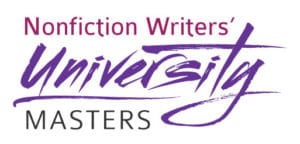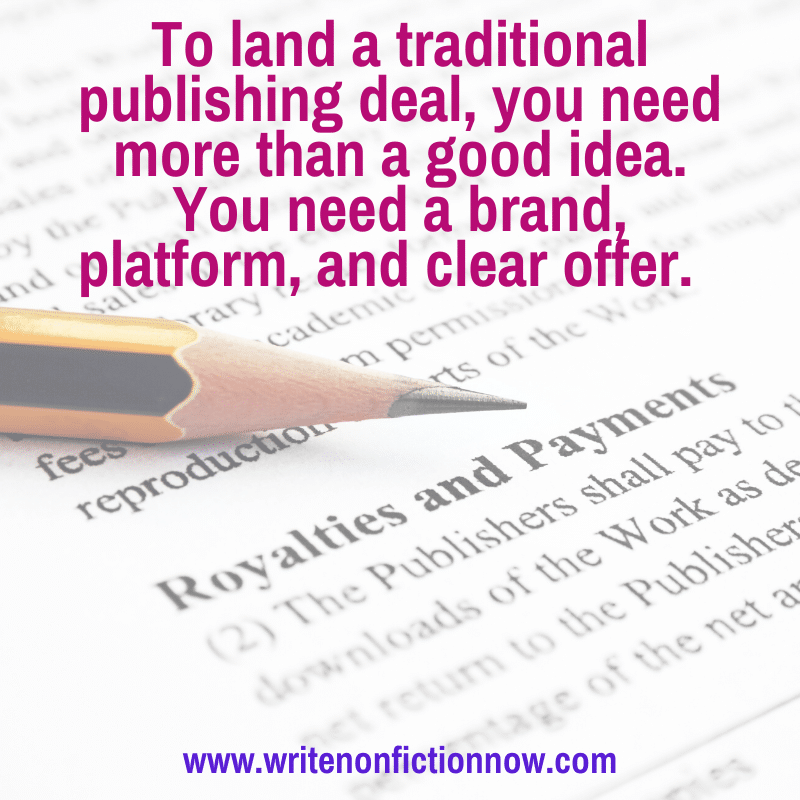As an agent, I get a lot of folks pitching me their nonfiction book ideas that, once they’re unleashed upon the marketplace, are sure to sell like mad automatically. After all, this idea is the one amazing thing that everyone needs—or so they say.
Even if you have a strong idea, publishing successfully is not that simple. Setting aside all the ideas that don’t get published, there are hundreds of thousands of new nonfiction books that hit the market each year, to say nothing of the countless books that already exist. So you’re going to have a little competition. That’s why agents and publishers are so concerned with details outside of the book itself, the most important being you, the author. In fact, at Fuse Literary, we take this a step further. We don’t just sign one book. We sign the author for their body of work so we can make an investment in growing a career, rather than just flipping an idea.
With that in mind, it takes a lot to get me interested in a new nonfiction project. Here are three main author qualities that can make or break a nonfiction submission for me.
1. A Brand
You need a brand.
This is a major part of what sets you apart from the crowd. It’s what people get from coming to you for a specific need rather than going to anyone else in your genre. In the marketplace, it’s how people can categorize you and know what you alone offer. It has to be memorable, and it has to be unique. Otherwise, it won’t stick. If your brand isn’t well defined or is too close to someone else’s, for example, I’ll have a hard time getting a publisher excited about you, and the publisher will in turn have a hard time convincing booksellers, reviewers, readers, etc. that your book is worth their time.
Figure this out early on—definitely before you begin writing your book. If you spend that extra time in the beginning mapping out that brand you’re going to have, ideally for the duration of your career, you’ll save an extraordinary amount of time and effort that would have otherwise been wasted floundering about in the process of finding yourself. You’ll get a lot fewer rejections, too, and in case you’re new to this, you usually don’t get a second chance once an agent or publisher has turned down your idea.
2. A Platform
You also need a platform.
You’re going to hear that word a lot if you want an agent and a traditional publisher. Basically, this is your effective reach within your target audience. It’s not just how many people you know. It’s more like how many people know you and respect you for that unique brand of assistance you offer. It’s the extent to which your brand sticks.
The bar for this is forever rising, and it can take years to build what you need, so best to start as soon as you figure out your brand. Actively build your stature and your network, and don’t ever stop. Set your ego aside, and seek to network with individuals and organizations that are more recognizable than you. And don’t just make it about yourself. People can usually tell the difference between someone who really cares about a community or a cause and someone who is only using that establishment for their own gain. Giving really is the most effective way to receive.
I highly recommend researching platform further. There are books, blogs, coaches, and many other great resources that you should take advantage of. And remember, it can take time, so stick with it. This should not be just about getting popular to sell books. It should be a choice you make for your life…and you just happen to end up selling more books because of it.
3. A Clear Offer
You then need to be able to articulate what you are offering.
This is the clincher. You could have the best idea and the biggest stage, but if you don’t know how to convey what you’re offering, no one is going to buy it. I’m not just talking about writing skills, though you’ll need to have those as well (or an excellent ghostwriter on your payroll). I’m talking about when someone asks that inevitable question: “What are you writing?”
Most of the time, whether it’s someone in the checkout line or an agent in a pitch session, you’re not going to have a lot of time to explain. You’ll need to know your idea inside and out, forward and backward, and you’ll need to be able to provide any specific detail at the drop of the hat. But here’s where it gets tricky—you’ll also need to know which details to spotlight and how to get that information across.
Your Query Letter and Book Proposal
I most often encounter this in the two major documents required for pitching nonfiction book ideas: query letters and book proposals. You will need both, and you’ll need them to be in top shape if you’re going to have a chance at traditional publication. I’m positive that there have been excellent book ideas that I’ve turned down simply because the author was not able to adequately present them in their query or proposal.
Resources abound here as well: books, blogs, articles, courses, even agents’ social media feeds can help. As for Fuse, we offer guides on our website. We also blog several times a week, we hold a weekly Q&A on Twitter, and you can usually find our agents speaking on these topics at major writers’ conferences across North America. We make such an effort to educate writers because it results in better quality submissions and fewer cases of that dreaded miscommunication.
Once you have these elements in place: your brand, your platform, and your ability to articulate what you’re offering, you’ll have a much better chance of acceptance by an agent, which is, in the end, what I most want to do when I sit down for a pitch session or open up my submissions inbox.
Have you found that brand, platform, and ability to pitch your book idea helped you land an agent? Tell me about your experience in a comment below. And, if you found this post helpful, please share it with another writer!
About the Author
 Gordon Warnock is a founding partner at Fuse Literary. As an agent, his nonfiction tastes are broad, and he especially enjoys self-help, pop-culture, current events, business, and memoir for adults – YA. His fiction list includes high-concept commercial, suspense, women’s fiction, and contemporary literary fiction for adults – YA. He also represents graphic novels and verse novels for adults – MG. As Editorial Director of Short Fuse Publishing, he has published The Short Fuse Guide to Query Letters, The Nonfiction Book Proposal Demystified, and many other works of nonfiction, fiction, and poetry. www.fuseliterary.com @gordonwarnock
Gordon Warnock is a founding partner at Fuse Literary. As an agent, his nonfiction tastes are broad, and he especially enjoys self-help, pop-culture, current events, business, and memoir for adults – YA. His fiction list includes high-concept commercial, suspense, women’s fiction, and contemporary literary fiction for adults – YA. He also represents graphic novels and verse novels for adults – MG. As Editorial Director of Short Fuse Publishing, he has published The Short Fuse Guide to Query Letters, The Nonfiction Book Proposal Demystified, and many other works of nonfiction, fiction, and poetry. www.fuseliterary.com @gordonwarnock Would you like to learn more about becoming a nonfiction writer and author? If you aren’t sure how to get started or to move forward on your nonfiction writing journey, check out the Nonfiction Writers’ University MASTERS program. Learn all the steps to becoming a successful—and profitable—author. Discover how (finally) to write consistently, boldly, enthusiastically, and productively. Develop the mindsets, strategies, habits of the world’s most successful writers. Make your difference today. Click here to learn more.
Would you like to learn more about becoming a nonfiction writer and author? If you aren’t sure how to get started or to move forward on your nonfiction writing journey, check out the Nonfiction Writers’ University MASTERS program. Learn all the steps to becoming a successful—and profitable—author. Discover how (finally) to write consistently, boldly, enthusiastically, and productively. Develop the mindsets, strategies, habits of the world’s most successful writers. Make your difference today. Click here to learn more.
(And if you aren’t ready for the Nonfiction Writers’ University Masters program, explore the Nonfiction Writers’ University. You can enjoy a 30-day trial membership for only $1.)

Sanjeevv K Somanath says
Quite am informative article Gordon. I had self published a book last year and am on the lookout for a publisher now. Have gotten through to a couple of Indian publishing houses and am in process of filling the book proposal form and that’s where I got some clarity from this article
Thanks a ton.